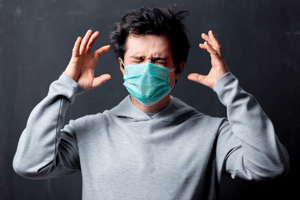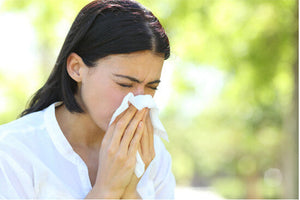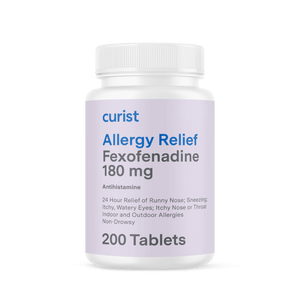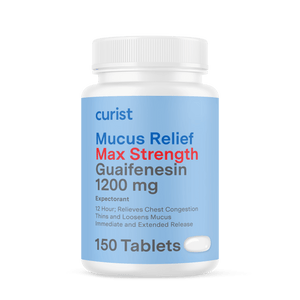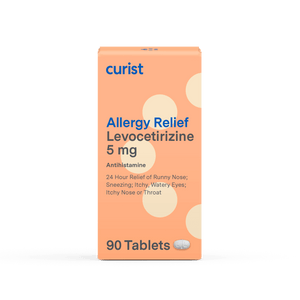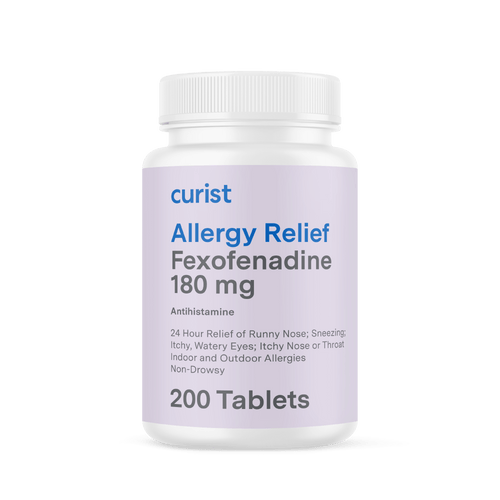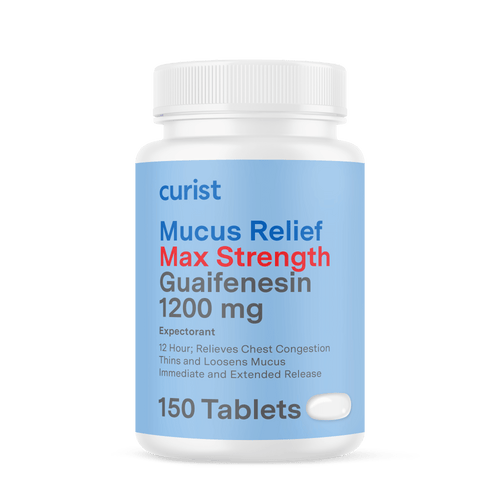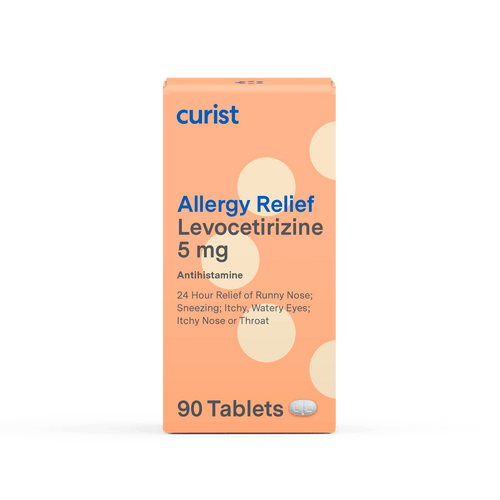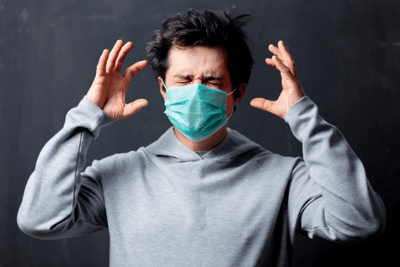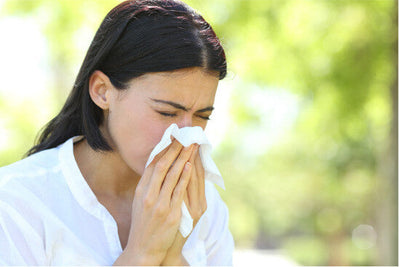by Audrey Anderson, The University of Texas at Austin College of Pharmacy, and Dr. Marc Goldstein, MD, Curist Medical Advisor
Curist delivers over-the-counter medicines to your door at a fraction of the price of traditional brands. We hope everyone stays safe and healthy during this time.
Figuring out what’s causing your runny, stuffed-up nose and sneezing can be tricky. The common cold and allergies are two widespread causes of upper respiratory tract complaints. Understanding the cause of your symptoms can help you make effective decisions for treatment and prevention.
What is the Common Cold?
Colds are viral upper respiratory tract infections that primarily affect the nose, throat, and sinuses. Although these infections are normally not serious and can generally be treated with over-the-counter medicines, colds are a leading cause of missed work and school days. Rhinoviruses are the major culprits of the common cold, but adenoviruses, parainfluenza, coronaviruses, and several other viruses are known to cause colds. When these viruses invade the upper respiratory tract, they cause infected cells to release signaling molecules which stimulate immune and nervous system responses. These responses lead to cold symptoms such as sneezing and nasal congestion. The infection resolves once enough IgA or IgG antibodies are concentrated in the infected tissues to fight off the virus, the virus stops reproducing, and tissue inflammation resolves.
Colds are normally spread when the nose or eyes are touched with hands that picked up the virus from another person or object. Inhaling virus particles from a sick individual’s cough or sneeze can also spread colds. Smoking, chronic stress, not getting enough good quality sleep (<7 hours of sleep), and leading a sedentary lifestyle rather than an active one are some of the risks linked to making individuals more susceptible to the common cold. In addition, exposure to environments that bring you into close contact with sick individuals, like classrooms and daycares, can also make you more likely to contract a cold.
What Are Common Cold Symptoms?
A sore throat is normally the first symptom to emerge in a cold, normally 1-3 days after infection. Symptoms which follow often include sneezing, a runny nose, nasal congestion, and sinus pressure. A cough, low grade fever (oral temperature of 100.4℉ or lower), headache, chills, general discomfort, and muscle soreness are also possible, but less common. Although there is no cure for the cold, symptoms generally resolve within a week or two.
What are Allergies?
Allergies are caused by reactions of your immune system to allergens. Allergens that can cause this reaction are unique to each person, but common allergens are pollen, mold spores, dust mites and pet dander. The development of an individual’s allergy is complex, and some parts of the process are still not entirely understood. The release of chemicals like histamine by the immune system cause allergy symptoms such as sneezing, nasal congestion, a runny nose, itchiness, and red, watery eyes.
To learn more about allergies and histamines check out All About Allergies, Antihistamines: Fighting Back Against Allergies, and Outdoor Allergy Tips: Enjoy Your Picnic Allergy Free.
How Do I Catch Allergies or Colds: Which Is Contagious?
Colds can be spread from person to person, but allergies cannot. Colds are an infection, but allergies are a unique sensitivity to environmental allergens. Actions that can prevent the spread of colds include 1) frequent hand washing, 2) covering coughs and sneezes with a tissue which is then thrown away, 3) using antiviral disinfectants to wipe down commonly touched areas. Preventing symptoms due to allergies involves minimizing exposure to the allergen that causes symptoms. Certain medications, like antihistamines and nasal corticosteroid sprays, may also be appropriate for preventing specific allergy symptoms in some individuals.
Colds vs Allergies: Symptoms & Duration
Because allergies and colds can both cause symptoms in the upper respiratory tract, recognizing whether symptoms like nasal congestion is due to allergies or a cold can be challenging. However, there are some important distinctions between the two.
Some symptoms such as sneezing, a runny nose, and nasal congestion are common in individuals suffering from either allergies or a cold. Oftentimes with seasonal allergies, symptoms can have an abrupt onset - feeling well one minute than suddenly feeling congested, sneezy and itchy. Cold symptoms develop more insidiously. In addition, the itchy eyes, nose, or throat common to allergies is absent in the common cold. While the throat may become itchy or irritated from allergies, the sore throat from a cold is generally more painful and is often most keenly felt when swallowing. A cold can sometimes cause a low grade fever, but allergies do not. Chills and general discomfort and muscle soreness are occasional in colds and absent in allergies.
The symptoms from the common cold normally last for about 7-14 days. The duration of allergy symptoms is variable and depends on the frequency of exposure to the allergen(s) and the severity of the allergic response. For instance, a brief visit to a friend’s house who owns a cat may lead to a few bouts of sneezing for one individual or an entire day of itchy, watery eyes for another. Some individuals experience symptoms of allergies year-round.
Is My Sneezing a Cold or Allergies?
Although both colds and allergies can cause sneezing, allergies often cause intense bouts of sneezing. Sneezing from allergies results from exposure to a trigger, or allergen, such as pollen or animal dander. For instance, visiting a friend with a cat may cause intense sneezing from someone with allergies. People with allergies also tend to recognize their allergy sneeze, whereas a sneeze from a cold may feel different than usual.
Is My Sore Throat a Cold or Allergies?
Allergies can cause an itchy, irritated throat but the scratchy, sore throat of a cold tends to be characteristically painful, especially during swallowing. The duration of the itchy throat is unique to each individual’s allergies, but a sore throat from a cold normally appears at the beginning of the cold and resides within a few days. Over-the-counter pain medications like Curist Pain Relief (Extra-Strength Acetaminophen, compared to Tylenol) can relieve the pain from a sore throat, but wouldn’t relieve the itchy throat caused by allergies.
Is My Sinus Pressure and Nasal Congestion From Allergies or a Cold?
Both colds and allergies can cause inflammation in the nasal passages and sinuses. This swelling can block the nasal passages and sinuses, making breathing through the nose difficult and feel pressure in the behind the cheeks, between the eyes and/or in the forehead. Nasal symptoms from a cold normally don’t last longer than 3-5 days, but the amount of time that allergies cause nasal congestion and sinus depends on the individual and their exposure to an allergen.
I Have Itchy Eyes, Nose, and Throat: Allergies or Cold?
Allergies cause an excessive release of histamines, which can lead to itchiness especially itchy eyes, itchy nose, and itchy throat. Antihistamines can normally relieve this itchiness. The cold doesn’t cause itchy eyes, nose, or throat.
Can Cold or Allergies Make Me Feel Sick, Achy, and Fever?
Colds occasionally cause a low grade fever (100.4℉ or lower) or chills and may cause slight malaise or general discomfort and achiness. While allergies may cause fatigue, allergies do not cause fever, chills, or muscle aches
Is My Runny Nose from Allergies or Cold?
Both allergies and the cold can cause a runny nose. In a cold, a runny nose often begins about a day after a sore throat starts. The nasal secretions are generally clear and/or watery at first. Then, the secretions from the runny nose usually begin to become thicker and may turn cloudy or change to a yellow or green color which may suggest the presence of a secondary bacterial infection. As the cold nears its end, the nasal secretions will often become thin and watery again. In contrast, allergies normally cause a runny nose that remains watery. A runny nose from a cold shouldn’t last longer than 10 days, but the duration of a runny nose from allergies depends on the individual and what causes their allergies.
Is My Cough From Allergies or Cold?
Colds cause a cough in about 30% of cases. In individuals who get a cough, the cough often starts after the sore throat and nasal symptoms have been present for a few days. Most individuals whose allergies are confined to the upper respiratory tract do not experience a cough from their allergies. However, some individuals with asthma and allergies may experience an asthma exacerbation when they are exposed to certain allergens. These exacerbations can cause coughing.
Best Treatment Options For Common Cold & Allergies
Although the common cold can disrupt your daily rhythm and plans, it generally does not lead to serious problems, and symptoms can often be relieved with natural remedies and over-the-counter medications. A pain reliever, like Curist Pain Relief, can help to common cold symptoms, likes aches, pains and fever. Symptoms from allergies can also be successfully relieved with over-the-counter medications. Take Curist’s quiz to find solutions for allergy symptom relief.

